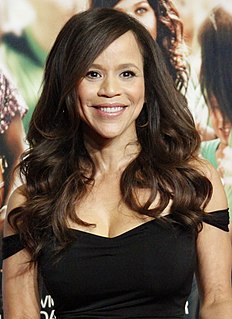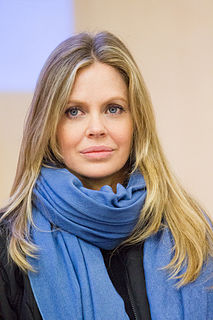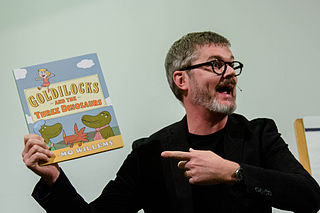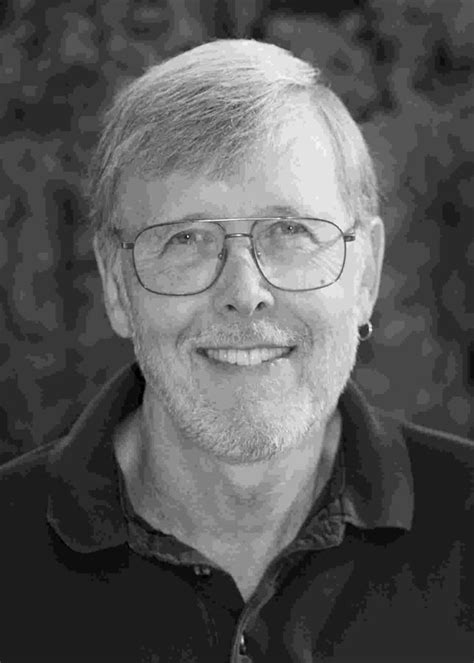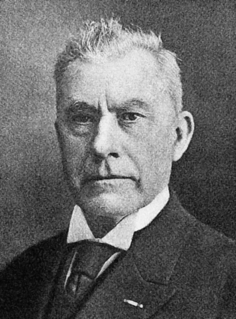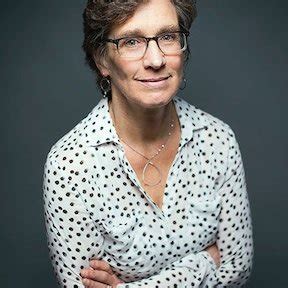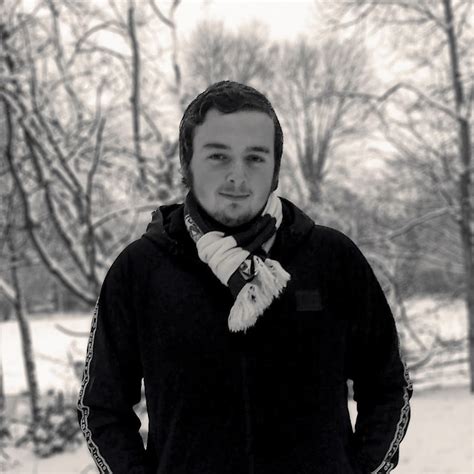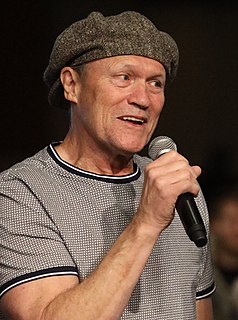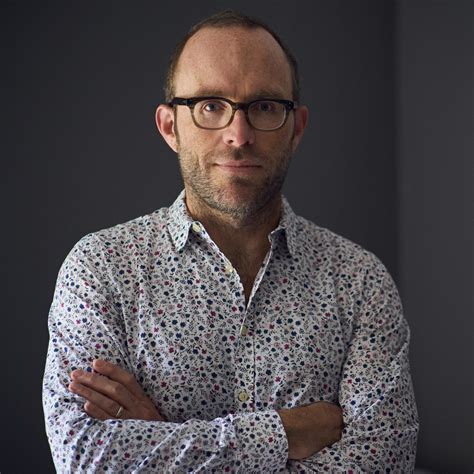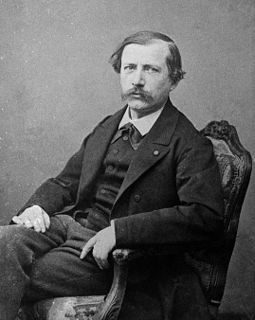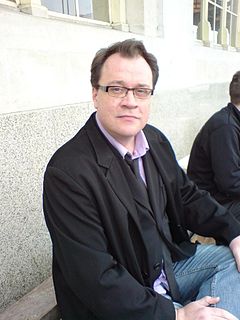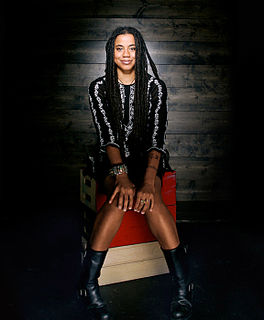Top 1182 Organic Quotes & Sayings - Page 20
Explore popular Organic quotes.
Last updated on December 23, 2024.
To achieve true sustainability, we must reduce our "garbage index" - that which we permanently throw away into the environment that will not be naturally recycled for reuse - to near zero. Productive activities must be organized as closed systems. Minerals and other nonbiodegradable resources, once taken from the ground, must become a part of society's permanent capital stock and be recycled in perpetuity. Organic materials may be disposed into the natural ecosystems, but only in ways that assure that they are absorbed back into the natural production system.
This new force, which was unknown until now, is common to organic and inorganic nature. I do not believe that this is a force entirely independent of the electrochemical affinities of matter; I believe, on the contrary, that it is only a new manifestation, but since we cannot see their connection and mutual dependence, it will be easier to designate it by a separate name. I will call this force catalytic force. Similarly, I will call the decomposition of bodies by this force catalysis, as one designates the decomposition of bodies by chemical affinity analysis.
I can tell you what I am working on, which is being more cognizant of my actions and how they affect others, most I will never meet. I've begun with my purchases. I'm focusing on quality versus quantity - a nicer tee-shirt with organic cotton and buying just one or two instead of five that are cheaper but made with GMO cotton, which is hard on Earth. It's caring a little more beyond myself. And I think it may be our only hope - and it feels much better to my soul, which in the end may be all we have.
I pay a lot attention to what I eat, but I don't have any specific slimming method. I eat organic food, a lot of fish, no meat, and I force myself to limit sugar, even if I like it a lot. It takes a lot of effort! I have to practice sport a lot because I love cakes. I've danced for a long time. I learned the discipline, how to like doing efforts, endurance. Today, I practice a physical activity at least once a day. I run or I take a hike. Sport is for me as much physical as mental.
I now say that the world has the technology - either available or well advanced in the research pipeline - to feed on a sustainable basis a population of 10 billion people. The more pertinent question today is whether farmers and ranchers will be permitted to use this new technology? While the affluent nations can certainly afford to adopt ultra low-risk positions, and pay more for food produced by the so-called "organic" methods, the one billion chronically undernourished people of the low income, food-deficit nations cannot.
Right now you're seeing more and more families reporting that they are skipping meals. They're having to give up meat. Mothers are foregoing food so their kids can have something. People are growing their own vegetables, not because they've gone organic, but because it's one of the few assured sources of food they have. For low-income Americans food is costly right now. The price of food has been going up, and wages haven't. This puts working Americans in a real bind. The fact that the mainstream media hasn't reported it doesn't mean that it's not happening.
The common thread of the series is that these are the books that Elephant and Piggie like to read. Elephant and Piggie are retired, so this is what they do in their spare time. What will they end up wanting to read? Time will tell. We've got to let that evolution happen as the series goes on. Any return of a character would have to be organic, would have to be, for example, Laurie Keller saying, hey, I really want to do this, and me feeling that there's a story there, rather than just saying, yeah, we can get three books out of these characters.
To plead the organic causation of a religious state of mind, then, in refutation of its claim to possess superior spiritual value, is quite illogical and arbitrary, unless one have already worked out in advance some psycho-physical theory connecting spiritual values in general with determinate sorts of physiological change. Otherwise none of our thoughts and feelings, not even our scientific doctrines, not even our dis -beliefs, could retain any value as revelations of the truth, for every one of them without exception flows from the state of their possessor's body at the time.
I do prefer doing more takes. There's something very organic that comes from the first take, but certain things come out. More details come out, in the way another actor says something. It's always this investigative process. You come further and further to the truth, the more you escalate. I like to do a lot of takes. I have a hunger for it. I like to see what there is to discover in a scene, that hasn't been thought of.
In the central cases of physical pain, then, it appears that at least part of what is bad about our condition is the way it makes us feel. Here there seem to be no problems with a purely mental state account, no counterpart to the experience machine that could bring us to think that we are being deceived by mere appearances. [...] If I am suffering physical pain then I can be quite wrong about the organic cause of my affliction, or even about whether it has one, without that error diminishing in the slightest either the reality of my pain or its impact on the quality of my life.
In its most primitive form, life is, therefore, no longer bound to the cell, the cell which possesses structure and which can be compared to a complex wheel-work, such as a watch which ceases to exist if it is stamped down in a mortar. No, in its primitive form life is like fire, like a flame borne by the living substance;-like a flame which appears in endless diversity and yet has specificity within it;-which can adopt the form of the organic world, of the lank grass-leaf and of the stem of the tree.
Man has risen, not fallen. He can choose to develop his capacities as the highest animal and to try to rise still farther, or he can choose otherwise. The choice is his responsibility, and his alone. There is no automatism that will carry him upward without choice or effort and there is no trend solely in the right direction. Evolution has no purpose; man must supply this for himself. The means to gaining right ends involve both organic evolution and human evolution, but human choice as to what are the right ends must be based on human evolution.
Yet soil is miraculous. It is where the dead are brought back to life. Here, in the thin earthy boundary between inanimate rock and the planet's green carpet, lifeless minerals are weathered from stones or decomposed from organic debris. Plants and microscopic animals eat these dead particles and recast them as living matter. In the soil, matter recrosses the boundary between living and dead; and, as we have seen, boundaries-edges-are where the most interesting and important events occur.
About writing I learned that always, always, always it's necessary to haunt your settings. I'm a big researcher. All my fiction is based on tons of digging. But the vital importance of actually traveling to the settings of a novel really hit me. And it's not just the setting details, not just the visuals and other sensory data, that will pop. You'll find surprising clues that swerve your story in whole new, deeper, surprising, more organic ways.
What I think is coming instead are much more organic ways of organizing information than our current categorization schemes allow, based on two units - the link, which can point to anything, and the tag, which is a way of attaching labels to links. The strategy of tagging - free-form labeling, without regard to categorical constraints - seems like a recipe for disaster, but as the Web has shown us, you can extract a surprising amount of value from big messy data sets.
I'm very much about the environment, I'm very much about health, about being able to, at the very least, eat organic, whole foods that are healthy for us. And then, of course, everyone being able to eat and at least have a humane way to live. There's enough for everybody, but unfortunately, there's a lot of greed and a lot of ego.
One of the problems is that the US government supports unhealthy food and does very little to support healthy food. I mean, we subsidize high fructose corn syrup. We subsidize hydrogenated corn oil. We do not subsidize organic food. We subsidize four crops that are the building blocks of fast food. And you also have to work on access. We have food deserts in our cities. We know that the distance you live from a supplier of fresh produce is one of the best predictors of your health.
In the final analysis the hierarchic pattern is nothing like the straightforward witness for organic evolution that is commonly assumed. There are facets of the hierarchy which do not flow naturally from any sort of random undirected evolutionary process. If the hierarchy suggests any model of nature it is typology and not evolution. How much easier it would be to argue the case for evolution if all nature's divisions were blurred and indistinct, if the systema naturalae was largely made up of overlapping classes indicative of sequence and continuity.
Our point of view is, lets not be so elitist that we can't honor good, hard, dignified, ennobling work: people working with their hands, building things, putting up solar panels, weatherizing homes, working on organic agriculture, building wind farms. We don't have robots in society, so somebody has to do that work. Lets make sure that the people who can use that work get a chance to do it. I see that as a first step toward bigger and better things.
There's always room. That's what the directors usually want. They want the performer to bring themselves and give what they have to give for the role. The smart ones allow that to happen because then it becomes even more organic within the performer's imagination. It becomes even more real. It's not always a given in other films, but when Gunn works, and we all work together in a collaborative way like that, it becomes a given that you bring it. It becomes a lot of fun.
Our bodies are garbage heaps: we collect experience, and from the decomposition of the thrown-out eggshells, spinach leaves, coffee grinds, and old steak bones out of our minds come nitrogen, heat, and very fertile soil. Out of this fertile soil bloom our poems and stories. But this does not come all at once. It takes time. Continue to turn over and over the organic details of your life until some of them fall through the garbage of discursive thoughts to the solid ground of black soil.
If Murakami's novels are grand enigmas, his stories are bite-sized conundrums. (...) The great pleasure of the new story collection, Blind Willow, Sleeping Woman, is watching Murakami come at his obsessions from so many different angles. There's a panoply of strangeness between these covers (.....) This collection shows Murakami at his dynamic, organic best. As a chronicler of contemporary alienation, a writer for the Radiohead age, he shows how taut and thin our routines have become, how ill-equipped we are to contend with the forces that threaten to disrupt us.
Slowly but surely I have been soaking Rilke up these last few months: the man, his work and his life. And that is probably the only right way with literature, with study, with people or with anything else: to let it all soak in, to let it all mature slowly inside you until it has become a part of yourself. That, too, is a growing process. Everything is a growing process. And in between, emotions and sensations that strike you like lightning. But still the most important thing is the organic process of growing.
Our families may be corrupted by worldly trends and teachings unless we know how to use the [Book of Mormon] to expose and combat the falsehoods in socialism, organic evolution, rationalism, humanism, and so forth.…And our nation will continue to degenerate unless we read and heed the words of the God of this land, Jesus Christ, and quit building up and upholding the secret combinations which the Book of Mormon tells us proved the downfall of both previous American civilizations.
Originally, the atoms of carbon from which we're made were floating in the air, part of a carbon dioxide molecule. The only way to recruit these carbon atoms for the molecules necessary to support life-the carbohydrates, amino acids, proteins, and lipids-is by means of photosynthesis. Using sunlight as a catalyst the green cells of plants combine carbon atoms taken from the air with water and elements drawn from the soil to form the simple organic compounds that stand at the base of every food chain. It is more than a figure of speech to say that plants create life out of thin air.
...there's no such thing as sustainability. There are just levels of it. It's a process, not a real goal. All you can do is work toward it. There's no such thing as any sustainable economy. The only thing I know that's even close to sustainable economic activity would be organic farming on a very small scale or hunting and gathering on a very small scale. And manufacturing, you end up with way more waste than you end up with finished product. It's totally unsustainable. It's just the way it is.
Because of the way that I work with the actors and because a scene is not in this rigid and literal interpretation of something written, I can constantly change stuff, which means I can get a scene absolutely perfect, and then when we go to shoot it, the requirements of the shot mean it would be useful to extend the dialogue or take a line out or swap things around. So the camera doesn't serve the action. The action serves the camera. That's important. So it becomes more and more organic and integrated.
Cancer can be attacked directly by metabolic enzymes and then be assisted by the enzyme diet programme. The second greatest cancer breakthrough of the 20th century is the metabolic organic effect on malignant tumours of correcting the body fluid pH to a non-acidic pH 7.1 to 7.5. A neutral pH 7.0 resists cancer formation. An acid body fluid pH of 6.44 and below permits tumours to biochemically become malignant. At pH 7.5 cancer may become inactive; at 8.5 tumours may disintegrate.
Google has - at least at this point - maintained the line where it keeps organic results separate from the advertisements. But over time - so in other words, you still get the - there still are honest to goodness results which are based on an algorithm which is based on how important or how many people link to that particular site, so there's that. At the very beginning, there were unobtrusive advertisements on the side that sort of showed up when you typed in certain phrases. Over time, the amount of real estate that those ads take up has increased.
Isn't it grand, isn't it good, that language has only one word for everything we associate with love - from utter sanctity to the most fleshly lust? The result is perfect clarity in ambiguity, for love cannot be disembodied even in its most sanctified forms, nor is it without sanctity even at its most fleshly. Love is always simply itself, both as a subtle affirmation of life and as the highest passion; love is our sympathy with organic life.
No single man makes history. History cannot be seen, just as one cannot see grass growing. Wars and revolutions, kings and Robespierres, are history's organic agents, its yeast. But revolutions are made by fanatical men of action with one-track mind, geniuses in their ability to confine themselves to a limited field. They overturn the old order in a few hours or days, the whole upheaval takes a few weeks or at most years, but the fanatical spirit that inspired the upheavals is worshiped for decades thereafter, for centuries.
But just in proportion as this process of extermination has acted on an enormous scale, so must the number of intermediate varieties, which have formerly existed, be truly enormous. Why then is not every geological formation and every stratum full of such intermediate links? Geology assuredly does not reveal any such finely graduated organic chain; and this, perhaps, is the most obvious and serious objection which can be urged against the theory. The explanation lies, as I believe, in the extreme imperfection of the geological record.
I know, that trends and all of those things and formulae that calculate what audiences want to see and what audiences don't want to see and various other demographic demarcations are the eccentric and ludicrous prerogative of Hollywood studios. But out there in the real world - by which I mean the rest of the world where we make truthful organic films, independent films unimpeded by interference - it's not about all those sort of calculating what is commercial. It's about wanting to say things and saying them in a way that will get through to people.
As things change in Turkey people find in religious observance a certain framework of safety, of continuity. This is quite a common phenomenon. In a strange way it's part of a democratization of society. Although religious observance seems more common these days, it's not that people who did not go to mosques have started to go to mosques. I don't know anyone in Turkey who's become a born-again Muslim. It's a question of individual choice, and it does not stop the organic secularization of Turkish society, which carries on regardless.
Do these fuels result always and necessarily in one way from the decomposition of a pre-existing organic substance? Is it thus with the hydrocarbons so frequently observed in volcanic eruptions and emanations, and to which M. Ch. Sainte-Claire Deville has called attention in recent years? Finally, must one assign a parralel origin to carbonaceous matter and to hydrocarbons contained in certain meteorites, and which appear to have an origin foreign to our planet? These are questions on which the opinion of many distinguished geologists does not as yet appear to be fixed.
Harriet Jones: Did you notice when they fart, if you'll pardon the word, it doesn't just smell like a fart, if you'll pardon the word, it's something else. What is it? It's more like, um... Rose Tyler: Bad breath. Harriet Jones: That's it! The Doctor: Calcium decay. Now that Narrows it down!.. Calcium phosphate. Organic calcium. Living calcium. Creatures made out of living calcium. What else - what else? Hyphenated surnames. Yes! That narrows it down to one planet! Raxacoricofallapatorius! Mickey Smith: [sarcastically] Oh yeah, great! We can write 'em a letter.
... we find ourselves facing a rising tide of biologically active, synthetic organic chemicals. Some tinker with our hormones. Some attach themselves to our chromosomes and trigger mutations. Some cripple the immune system. Some light up our genes and so enhance the production of certain enzymes. If we could metabolize these chemicals into completely benign breakdown products and excrete them, they would pose less of a hazard. Instead, a good many of them accumulate.
The physical basis for sociopathy is approximately 50 percent inheritable, which sounds more dramatic than it probably is, because most personality characteristics that psychologists test for and study the genetics of are about 50 percent inheritable. Introversion, extroversion, it turns out that they're about 50 percent inheritable, which means that somehow sociopathy is physical, it's organic.
Some people think I am an issue-oriented writer, but I've never said to myself, I'm gong to write about such-and-such an issue - that would make for incredibly boring writing, at least to my taste. Creating someone I don't know and her made-up world shows us more about who we are - is actually a better mirror - than if I were to parade in front of you an instantly recognizable person in an instantly recognizable situation. I'm not saying, Let's make it all abstract and weird and difficult and thereby you will know more about yourself. My process is much more organic than that.

